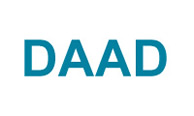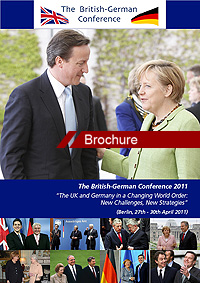The British-German Conference 2011
"The UK and Germany in a Changing World Order: New Challenges, New Strategies"
(Berlin; April 27th - 30th, 2011)
Conference Agenda
Program Aims - The British-German Conference 2011 will pursue five overlapping aims:
- To reflect on the changing global context within which the UK and Germany must define their priorities and policies
(Themes: Globalization, the global financial crisis, the digital revolution, interdependence)
- To provide a platform for British and German representatives to discuss global challenges
(Themes: Northern Africa and the Middle East, Afghanistan and central Asia, terrorism, religious tolerance)
- To explore, compare, and contrast British and German policies towards regional and global issues (Themes: The EU, climate change and natural disasters, NATO, Afghanistan and Central Asia)
- To analyse and assess the current strength of political, economic and cultural aspects within the British-German relationship
(Themes: Bi-lateral trade, political relations, academic & cultural exchange, language learning, public opinion & the media)
- To consider the future influence of the UK and Germany in international relations and the global economy (Themes: The United Nations, emerging economic powers, the EU)
The Conference will focus in particular on the following issues:
A Changing Context
- The erosion of the nation state and the emergence of new global political actors
- The digital revolution and its impact on the influence of citizens and civil society
- The emergence of new political and economic powers in Asia and Latin America
- New global actors and old nation states - competing for influence or forging stronger policies? (German\British responses to emerging States, representation at the UNSC Germany, Brazil, and India)
- Human rights and democracy in Africa - is there a danger of Liberal Imperialism?
New Threats and Challenges: British and German Perspectives
- The challenges and opportunities of military intervention in Libya
- Abstinence from the UNSC vote: is Germany marginalizing itself over the Middle East?
- The local and international consequences of global economic instability
- The threat of climate change and the struggle to establish international consensus
- Strengthening dialogue and understanding between Islam and the West
- Soft security policies: migration, multiculturalism & renewable energy
The British-German Relationship
- The development of British-German relations since 1945
- Queen Victoria, Prince Albert, and the historical roots of British-German relations
- Political relations under Conservative-led coalition governments
- Tourism and international trade between the UK and Germany
- Cultural, academic, and scientific cooperation: Areas for expansion
- The role of the media in influencing public opinion between the UK and Germany
The UK and Germany in the Emerging World Order
- Possible trends in the global economy in the coming two decades
- German membership of the United Nations Security Council
- The prospects for future military and humanitarian activity by the EU and NATO
- British and German relations with Russia, China, and the Middle East
- The future of EU foreign policy

































































































